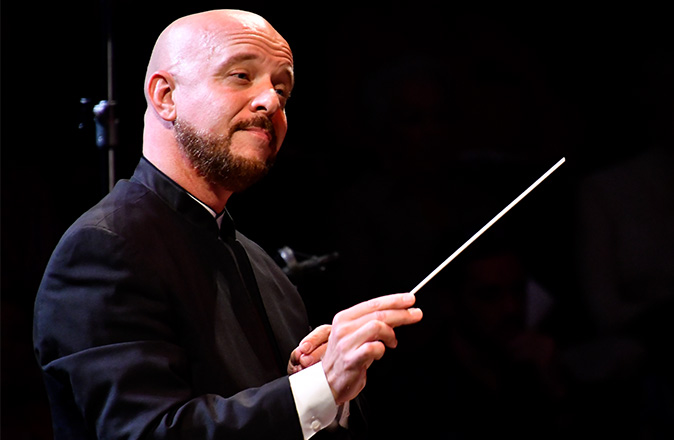Seraphic Fire takes flight in a wide range of Romantic song
While composers of the Romantic era are best known for their orchestral, chamber and solo instrumental works, choral music played a major role in the period’s creative ethos. Texts about nature and matters of the heart began to supplant sacred tracts as the basis of vocal scores as artists of that time sought to put their own stamp on the compositional process.
Seraphic Fire opened its annual Enlightenment Festival with “Romantic – Schumann & Mendelssohn,” a generous program of rarely heard pieces from that rich oeuvre. On Friday night at St. Philip’s Episcopal Church in Coral Gables, James K. Bass led the 13-voice contingent in distinguished performances that spanned a wide spectrum of styles, each composer putting their own stamp on musical romanticism.
With singers playing tambourine and triangle, Robert Schumann’s lied “Zigeunerleben” pictured gypsy life and dances in vigorous terms. When Bass leads the ensemble, textures and balances of female and male voices assume special clarity and definition, which was evident from the first bars. In solo cameos, soprano Elisse Albian, alto Gabriela Linares, tenor Brad Diamond and bass Chris Talbot made brief but distinctive contributions to Schumanns’ invigorating vocal palette. Anna Fateerva’s piano accompaniment had the full measure of the composer’s expansive writing. “Ungewisses Licht” displays Schumann’s darker side. The song evokes a foreboding light that turns out to be death, voiced in appropriately deep and solemn tones.
The lyricism of Clara Schumann’s “Vorwärts” and “Abendfeier in Vendig” sing with beauty of melodic reflection. One of the most renowned pianists of her day, the wife of Robert Schumann’s choral postcard from Venice rings with potent sensitivity, especially when sung with the silvery beauty of the Seraphic Fire vocalists.
Turning to French choral song, Gabriel Fauré’s “Madrigal” paid tribute to Renaissance and Baroque roots while evidencing the charm of a Gallic chanson, shaped felicitously by Bass. The stillness of night was vividly woven in wonderfully transparent and varied dynamics of “Calmes des Nuits” by Camille Saint-Saēns.
Charles Villiers Stanford (1852-1924) was a prominent English pedagogue whose students included Holst and Vaughan Williams. Stanford’s “The Blue Bird” portrays a bird high in the sky and Rebecca Myers’ ethereal soprano soaring above the choir provided the perfect aural snapshot. The music of Samuel Coleridge Taylor (1875-1912), a Stanford pupil, is, happily, being rediscovered. His “Whispers of Summer” is a lovely salon ballad, voiced with delicacy and shimmering beauty.
The deep European legacy of lieder was fully evident in two works by Schubert, one of the greatest song composers. John Buffett’s mellow bass took solo honors in the flowing lines of “Des Tages Weihe.” The more reverent “Hymne an den Unendlichen” (Hymn to the Infinite) provided a wide spectrum of colors and depth of feeling.
Fanny Mendelssohn Hensel wrote over 500 compositions, publishing only a few near the end of her tragically short life. “Schilflied” and “Schweigend sinkt die Nacht” probably were performed at her many salons and reflected the songful intimacy of direct expression, beautifully conveyed.
Her famous brother Felix Mendelssohn was prolific, composing in virtually every musical form except opera while pursuing a major conducting career, His “Mitten wir im Leben sind” (In the middle of our lives) for double choir proved the concert’s high point.
This seven-minute creation owes much to Mendelssohn’s admiration of Bach (whose music he helped revive). Deeply religious in nature, the work is nothing short of a neglected masterpiece. Bass told the audience he has been wanting to perform Mendelssohn’s opus since he was a teenager. His enthusiasm for the large-scale creation was evident in the sonority, detailing and sheer emotional intensity of utterance he drew from the chorus. Deploying sopranos and altos on one side, tenors and basses on the other, the corporate sound in the high ceilinged sanctuary reverberated to stunning effect.
Brahms’ Vier Quartette, Op. 92 concluded the evening. Presenting Brahms’ at the height of his mature powers, these songs are both serene and vivacious. Fanteeva reveled in Brahms’ sweeping keyboard lines and the chorus’ warm timbres formed the friendly dessert at the end of a heady musical dinner. Odes to the night inspired lovely melodies in “O Schöne Nacht” and “Abenlied and Worum” was a close as Brahms came to heroic voicing.
The entire concert of memorable, rarely heard music proved again what a special, indispensable part of South Florida’s culture fabric Seraphic Fire is. There are two remaining performances of this unique program which should not be missed by true lovers of vocal music.
Seraphic Fire repeats the program 7:30 p.m. Saturday at All Saints Episcopal Church in Fort Lauderdale and 4 p.m. Sunday at St. Gregory’s Episcopal Church in Boca Raton. seraphicfire.org
Posted in Performances
Leave a Comment
Sat Mar 1, 2025
at 1:48 pm
No Comments
